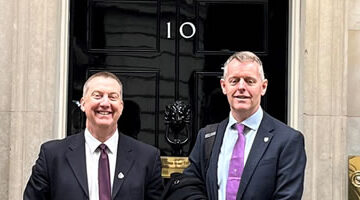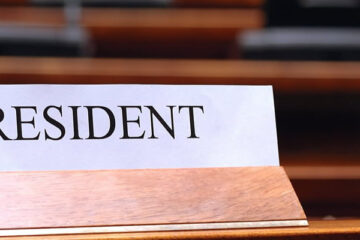President’s Blog December 2015
We had a ball! Hot off the press as I write, the Inaugural Dinner of the Royal College of Emergency Medicine held last night was undoubtedly the highlight of the year. Two hundred and fifty guests, VIPs, alumni, giants of the specialty, front line clinicians from all countries of the U.K. and Ireland with our patron Her Royal Highness the Princess Royal – it was quite an evening. Held in the imposing surroundings of the Great Hall of Lincoln’s Inn, gowned in the regalia of the College I made a passable understudy for Dumbledore. This was an opportunity to step out of the vortex of the debate around contracts and indeed to forget for a few hours the current pressures of work. Surrounded by so many friends and colleagues, supported by so many other college presidents and given the opportunity to speak candidly of the aims and aspirations of all emergency physicians it was a unique evening in the history of the College and our specialty. If you were there, thank you for making it such an enjoyable and worthwhile occasion. If you were not there perhaps we will arrange an anniversary dinner in due course?!
Christmas will soon be upon us and I very much hope that all of us will get to spend time with family and friends to recharge the batteries and provide that all important perspective on life. Recently several friends and colleagues have experienced serious health issues; at such times one is reminded of the vicissitudes of life and the unparalleled value of good health. Ensuring that each and everyone of us has the opportunity to achieve a proper balance between our working lives and personal lives has been a key theme of college activities for more than three years. We have published various documents aimed at supporting members and fellows to achieve sustainable work patterns and the current contribution of the College regarding contracts is focussed on equity and sustainability.
The pressures on the College have been considerable and we have experienced the wrath of politicians, advisors, members and commentators. I would like to thank my fellow College Officers for their sage advice, guidance and loyalty. Without such a talented and cohesive team the College would be far less effective.
For the second part of this report I offer some extracts from my speech at the inaugural dinner – not out if laziness but because I would wish to share with all fellows and members the key messages I conveyed to the great and good on your behalf.
“… the unique feature of emergency medicine is the case mix and attendance pattern of our patients. A 24/7, 365 days per year specialty tasked with the assessment and management of undifferentiated illness and injury, irrespective of age or gender.
Contrary to the uninformed assumptions of TV producers we do not aspire to an adrenalin filled daily diet of resuscitation, we are unimpressed by flashing blue lights, ‘code reds’, and ‘black alerts’. No; we share with clinicians from all clinical specialties the Hippocratic goal to ‘cure sometimes, relieve often but care always’. In the 21st century with an ageing demographic this is the pattern of our daily work.
Our current campaign to highlight and eradicate exit block, where lack of available beds prevents timely admission from the emergency department, aims not to ensure we have more space to cure or resuscitate but to remove the unacceptable consequences of overcrowding which diminishes our ability to ‘care always’ and to be seen to ‘care always’.
The emergency department is the ‘shop window’ of the hospital. It is self evident that we need to decongest our departments and provide the time and space for clinical excellence, for clinical care, personal care and mental health care.
Patients are rightly the focus of this campaign to improve care but let us not forget our staff. We are here this evening to celebrate our title as the Royal College of Emergency Medicine – not the Royal College of Emergency Doctors. The clinical staff working in emergency departments throughout the UK have not been well served by the current resource allocations either to hospitals or practitioners. The mismatch between demand and resource continues to grow – currently there is one Emergency Medicine consultant in the UK for every 11500 patient attendances and only a fool would suggest that past performance is not a guide to the coming winter’s challenges.
The college strives to promote emergency medicine as a career whilst simultaneously drawing attention to the inherent flaws of the prevailing recruitment and retention strategies, overcrowding and the lack of alternative appropriate seven day services. This year saw the highest recruitment rates ever and a fill rate at higher specialty training levels of almost 80%. We must continue this momentum as it is in nobody’s interests to either provide or receive poor care in our A&E departments.
The irony of a world leading training scheme and exit examination hosted by a country that increasingly finds many of its alumni seeking work overseas in search of a more sustainable career, one in which there is more time to care for patients and more capacity to care for practioners is not lost on those of us who remain.
The College has therefore come of age fully aware of the challenges it faces. The College is in good health but within a system that is not. We accept our responsibility to inform the debate, win the arguments and in particular to collaborate with our fellow colleges to ensure the views of frontline staff are represented to ensure high level decisions are connected to the real world.
In this regard Colleges are unusual – not for us a hierarchy in which those elected to lead are removed from the clinical environment that is our raison d’etre. Of the 150 fellows of the College here this evening there will be many joining me in the ever popular two till midnight shifts this weekend. This is as it should be – the reason medicine is such a trusted profession is the direct link to patient care of even its most senior practitioners.”
Most of us will similarly be working to cover our departments 24/7 over the Christmas and New Year period. We must do all we can to support each other for we ‘will pass this way but once’. I wish each and everyone of you a happy Christmas and a peaceful New Year.
Dr Cliff Mann FRCEM FRCP
President
The Royal College of Emergency Medicine
@RCEMPresident


0 Comments